It has been a while since I have done anything with the Idolmaster franchise. When I discovered that Bandai Namco released a 2nd idol producing game under the 2nd vision series of games called The Idolmaster One for All. Since this game is not story oriented compared to the previous games and is more akin to a slice of life, I will be giving my final impressions of the gameplay. (Image Source)
Idolmaster One for All is basically the free produce version of Idolmaster 2, which allows you to produce any of the 13 members from the fictional 765 Productions while not being bound to any time limit besides the season goal. While you start with three members, you can freely choose to use one to five members at will. However, only the current leader can participate in promos and be able to rank up from a rank up festival. Even so, you can change the leader anytime and get all the endings with one save file.
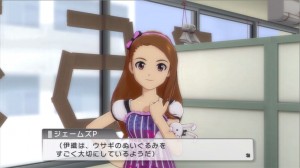
As for the communications, they work slightly different in this game. Promotions now require no interactions, while a touch communication (ふりあい) option focuses more on interacting with an idol you choose. Like the previous games, depending on the event, you will be required to make split decisions or touch the idol. If successful, the idol’s heart member will increase depending on the result (the max is 6 for each idol). In addition, you may get random events before and after the week ends, which gives you an opportunity to raise the meter for a certain idol, even for ones you haven’t unlocked yet.
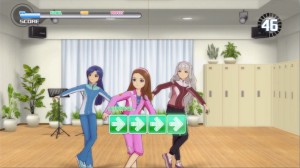
The major change in this game compared to Idolmaster 2 is how image stats are now handled since the idol’s current level determines the image stats. This means that you have to do some kind of work whether it’s a promotion, audition, live or festival to gain experience along with fans and money. Because of this change, lessons will only give a temporary stat boost that lasts for a few weeks instead of being permanent. Like the last game, the song choice and coordinates (equipped costumes and accessories you use) will still have some effect on the unit’s stats.
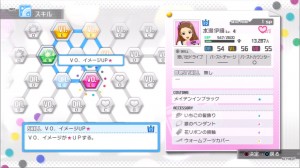
New to this game are skills. Each idol now has a skill tree (similar to Final Fantasy X) that allows one to gain new skills such as a boost for a certain image stat, burst counters, memory drives, burst charges and passive skills. To unlock them, you need to have enough skill points (which are gained from leveling up) while being at the required idol rank.
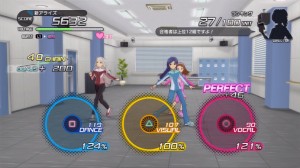
As for the main part of the game, the gameplay of Auditions, Lives, Festivals and All Star Lives (basically a marathon of three songs and if cleared, can unlock songs and outfits) are pretty much the same except for clear requirements. If you haven’t played Idolmaster 2, this game is not like Project Diva where you press the corresponding button. The rhythm aspect of this game is more strategic since you have to give an appeal that will give you the highest score. This is indicated by the image stat values and its appeal percentage, which decreases every time you press it while the other increases (DA > VI > VO > DA).
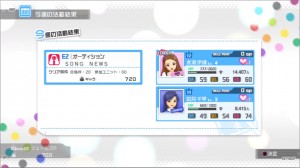
Aside from that, the gameplay is similar to the previous game with some new additions such as skills, skill boost (which is a stat bonus), a last appeal counter and other bonuses. Doing a perfect appeal will charge the voltage meter. When full, you can perform a Burst Appeal, which gives you more points and push your score higher. Aside from that, the gameplay is the same for all four modes, except for Festivals, which requires the strategic use of memory drives and the timing of a Burst appeal or counter.
As a whole, I enjoy Idolmaster One for All quite a lot for the fact that there is a lot of freedom without worrying about time limits or having the Danketsu meter drop too low from making the wrong choices. It’s definitely a game worth looking at if you are interested in idol simulators (or idols) in general and enjoy rhythm games. This game can be played without any knowledge of Japanese, but you won’t get the full experience such as learning more about the idol you are producing.
The Bottom Line
Strengths: The ability to produce all 13 idols, more freedom compared to previous games, deeper gameplay, enjoyable characters, good song selection, and eye-catching graphics.
Weaknesses: Since this is Bandai Namco, the DLC will be expensive. Also, some of the songs that were included in previous games are not in this game. Dialog is still auto advance (although you can still pause the game to read it)
Note that I will be streaming this game on Twitch every Saturday evening until Summer Break ends, so feel free to watch.



thanks for the review